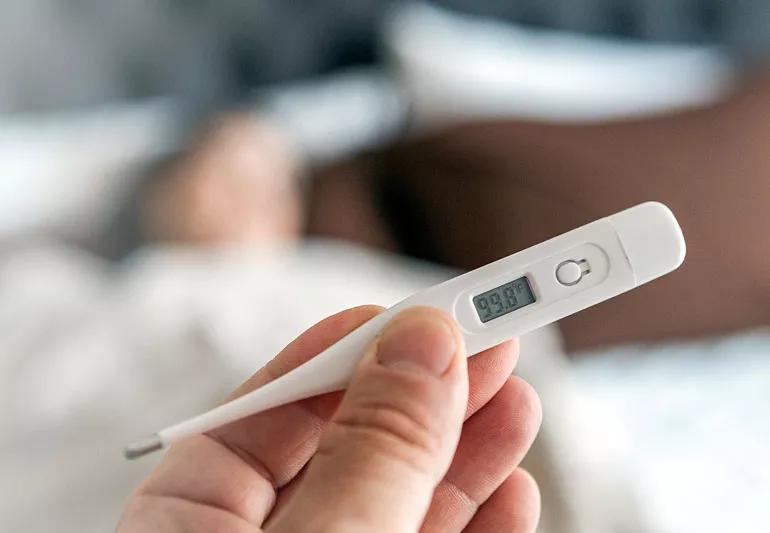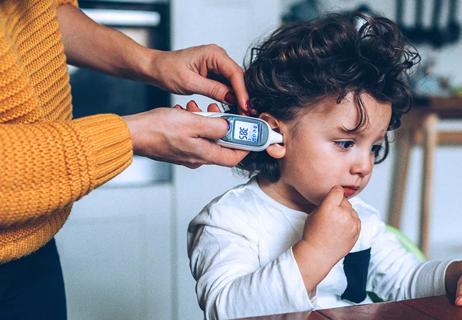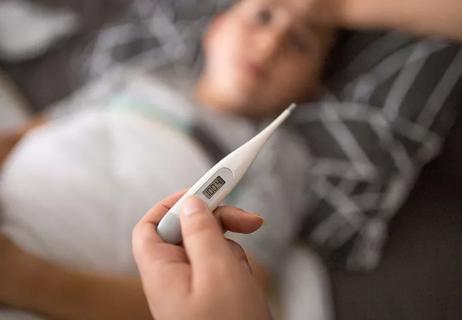There’s no one answer, as your temperature fluctuates throughout the day and your life

What is a normal body temperature? That question is harder to answer than you might think.
Advertisement
Cleveland Clinic is a non-profit academic medical center. Advertising on our site helps support our mission. We do not endorse non-Cleveland Clinic products or services. Policy
The reality is that there isn’t one exact “normal” body temperature. Everyone has their own ordinary — and even that is more of a sliding scale than one set number throughout your lifetime.
But there are ranges and trends to body temperature and times when you need to pay close attention to the reading on a thermometer. Let’s get the details from family medicine physician Donald Ford, MD, MBA.
Most people probably grew up being told a body’s normal temperature was 98.6 degrees Fahrenheit (or 37 degrees Celsius). That widely accepted number originated from a study done in the mid-1800s.
But newer studies suggest the average person today actually runs a little cooler than that — somewhere between 97.5 F (36.4 C) and 97.9 F (36.6 C).
So, which number is correct? Well, probably all of them, says Dr. Ford. The truth is that your body temperature can move up and down and all around — though, it usually stays within a certain window.
“Typically, anything in the range of 97 to 99 degrees Fahrenheit is considered normal,” he says. “But there are times when a perfectly healthy person might have a body temperature that’s slightly higher or slightly lower than that.”
Your “normal” body temperature changes throughout your life. It often rises from childhood into adulthood before dipping during the later years of life. By stages, it looks like this:
Advertisement
The typical body temperature range for children between birth and 10 years old goes from 95.9 F (35.5 C) to 99.5 F (37.5 C). This would be a temperature measured through an oral reading.
The typical body temperature range for people ages 11 to 65 is 97.6 F (36.4 C) to 99.6 F (37.6 C).
The typical body temperature range for people older than 65 is 96.4 F (35.8 C) to 98.5 F (36.9 C).
A temperature that’s higher than 100.4 F (or 38 C) is considered a fever, and it’s usually something you should bring to your doctor’s attention — especially if it lingers for more than two days, Dr. Ford says.
Oftentimes, a fever is your body’s reaction to an infection or virus (like influenza). A fever itself doesn’t require any specific treatment, other than trying to bring the temperature down for your comfort.
Persistent low-grade or high-grade fevers could signal that something else is going on in your body. A number of medical conditions, including hyperthyroidism and other endocrine disorders, can raise your body’s core temperature.
As for that gray area between a fever and the high end of a healthy temperature?
“We generally call this a ‘low-grade’ temperature,” Dr. Ford explains. “It’s certainly something to watch, but it’s hard to know the significance of this.”
Young kids generally tend to push thermometer readings higher than adults. Their bodies haven’t yet mastered the art of regulating their body temperature, so they’re also more likely to spike fevers — and severe ones, at that.
“You may see a child that goes up to 103, 104, 105 degrees,” Dr. Ford says. “We recommend acetaminophen to try to prevent a rapid spike in temperature, which can induce some other problems.”
If your child’s fever doesn’t come down with fever reducers, or if an infant younger than 3 months develops a fever, call your pediatrician.
Studies show that core body temperature decreases with age. Hypothyroidism, or an underactive thyroid, can also slow down metabolism, which can lead to a drop in body temperature.
If your core body temperature dips down to 95 F (35 C) or lower, that’s considered hypothermia. It’s often caused by exposure to cold weather, but there are other factors that can put you at risk for hypothermia, such as age and certain medications.
Hypothermia is a medical emergency, so call 911 if you suspect you or someone has hypothermia.
If you take your temperature with three different kinds of thermometers, you might get three different results.
Advertisement
A thermometer that goes under the tongue will likely give you a slightly higher reading than a forehead thermometer or one that goes under your armpit. (But those kinds may be easier to use with young kids.)
Which is the most accurate? That would be a thermometer that goes under your tongue. “Testing an internal temperature is going to be more accurate than testing an external temperature,” states Dr. Ford.
A rectal thermometer, typically used with young children, would be more accurate for the same reason. A thermometer used rectally should never be used orally to avoid spreading bacteria. Keep thermometers used orally and rectally separate and clearly marked.
There’s usually a reason why you head to the medicine cabinet to grab your thermometer: Someone in the house doesn’t feel well.
“Consider that the ideal time to take your temperature given the important information the reading provides,” says Dr. Ford. “Temperature is one of your vital signs, and it’s an important indicator of your health.”
But know this: Body temperatures typically run a little lower in the morning and a bit higher in the afternoon. It also can fluctuate with menstrual cycles.
A healthy body is generally pretty good at keeping its temperature at a comfortable level.
Advertisement
“For example, if you go outside on a very cold day, you will notice that your skin temperature is going to go down but your core temperature inside will stay in the normal range,” explains Dr. Ford.
A part of your brain called the hypothalamus is responsible for this. When you get too cold, it signals your body to preserve heat by shrinking the blood vessels, and to produce heat by shivering. And when you get too hot, it signals your body to make sweat to cool off.
That’s why it’s normal for your temperature to change within a healthy range as you move through your day and your life.
“‘Normal’ is a range, and people shouldn’t get worried if their temperature is varying a little bit within that range,” Dr. Ford advises. “That doesn’t necessarily mean anything good, bad or otherwise.”
But if you have any questions or concerns about your temperature, don’t hesitate to call your healthcare provider.
Advertisement

Sign up for our Health Essentials emails for expert guidance on nutrition, fitness, sleep, skin care and more.
Learn more about our editorial process.
Advertisement

The not-so-sweet heat could be from a medical condition, menopause or even spicy foods

You can use a digital, tympanic or temporal artery thermometer

Use a digital oral, rectal, axillary, ear or forehead thermometer based on your child’s age

Know the risks, the signs and actions you should take

And 4 things you can do to combat heat and cold intolerances

The short answer from a family medicine specialist

Any fever, especially one of 100.5 degrees Fahrenheit or higher, should trigger a call to your oncologist — and maybe a trip to the ER

A combination of rest, fluids and over-the-counter medications can help you feel better fast

Even small moments of time outdoors can help reduce stress, boost mood and restore a sense of calm

A correct prescription helps your eyes see clearly — but as natural changes occur, you may need stronger or different eyeglasses

Both are medical emergencies, but they are very distinct events with different causes